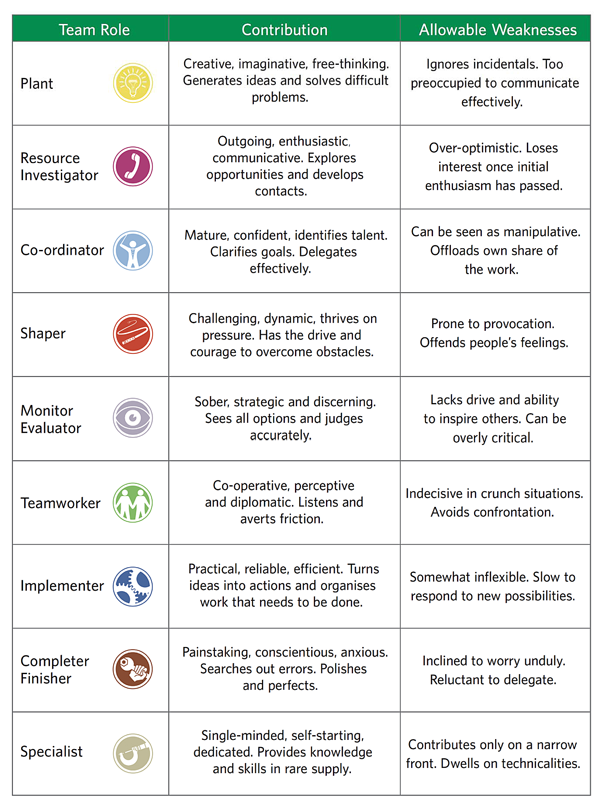Team Roles Definition
Who is who in the team? Is it really necessary to define the team roles? Read about Belbin’s research.
What Is the Team Roles Definition
Team roles describe interactions of the team members. The IT industry has a huge range of job titles which can be confusing - it is sometimes difficult to figure out what exactly each job means. Defining team roles and responsibilities is crucial for any project. Not all of them are required all the time, in every project, for every task. Every team is unique and choosing accurate roles can make your life significantly easier.
Team roles represent a tendency to interact with others in a specific way to make the progress of the team easier. Teams need the following nine role types, according to Dr. Meredith Belbin’s "The Coming Shape Of Organization":
- Plant Proposes new ideas and solves difficult problems. Example: Director
- Resource Investigator Explores opportunities, handles external contact. Example: Product Owner
- Coordinator/Chairman Clarifies goals, coordinates resources. Example: Project Manager
- Shaper An alternative to a coordinator. Gives coherence to team work.
- Monitor/Evaluator Evaluates ideas, looks for different perspectives. Example: Test Analyst, Tester
- Teamworker Builds bridges, takes care of the team spirit Example: Team Lead, Scrum Master
- Implementer Pursues the plans into practice. Example: Developer
- Completer/Finisher Searches for errors. Example: Tester, QA Manager
- Specialist Provides scarce knowledge and skills. Example: Senior Developer
 Source: Belbin Team Roles
Source: Belbin Team Roles
Why You Might Want the Team Roles
Belbin recognized that the team success depends on the behavior of the team members. Defining various team roles allows you to match job requirements with the appropriate skills and, therefore, you can create a well-balanced team. Belbin’s research shows that the team tends to work more cohesively if the team members understand their individual roles. Familiarity leads to better performance, sharing information engages team members to find constructive solutions and ideas. It reduces misunderstandings and disputes. Finding a good match between the team members and their roles eliminates mistakes and improve quality of work.
Problems the Team Roles Solve
- Demotivated team
- "Not my problem" mentality
- Toxic team culture
- Unsuccessful product
- Unhappy clients
How to Define the Team Roles
- Maturing team roles Team roles and their responsibilities are not always necessarily static. Team members can adopt different roles at different times, team roles develop and mature.
- Hiring It is important to define the roles you need in your team and then recruit, hire, train, and retain the right people. Define the roles before hiring! Look into the applicants’ qualifications, characteristics, strengths, and weaknesses. Explain clearly their responsibilities to them.
- Understanding Each team member also has to know their superiors, corresponding expectations, experience and educational requirements, team goals, and how they will be evaluated.
- Chart It is a good idea to create a chart once you are finished with creating the team roles. The team members would understand the relationships easier if they can look at it.
Common Pitfalls of the Team Roles
- A plant ignores incidentals and does not communicate effectively.
- A resource investigator is over-optimistic and loses interest when the initial enthusiasm passes.
- A coordinator can be seen as manipulative.
- A sharper offends people's feelings.
- A monitor/evaluator is overly critical and does not inspire others.
- A teamworker avoids confrontations.
- An implementer does not respond to new ideas or possibilities well or fast enough.
- A completer/finisher does not want to delegate work.
- A specialist is focused on unnecessary technicalities.
Resources for the Team Roles Definition
Was the article helpful?
Want to write for DXKB?
Feel free to contribute. People from DXKB community will be more than happy.
Prokop Simek
CEO
Related articles
ALL ARTICLES
Home Office
Home office or remote working means working from a person's residence for official business purposes. The term also means the Ministry of Interior in the UK or the domiciled headquarters of a large company.
Read moreMentoring
Mentoring is a supportive learning relationship between a mentor who shares knowledge, experience, and wisdom and mentee who is ready and willing to benefit from this exchange, to enrich their professional journey.
Read moreTeam Lead
Team leads are responsible for the team’s well being. They protect their team from managers and stakeholders. They ensure that the team and stakeholders are on the same page.
Read moreBus Factor
A Bus Factor measures the minimum number of team members who have to be hit by a bus to put the project in jeopardy. The goal is to increase your Bus Factor as much as possible.
Read moreProduct Owner
A Product Owner represents the voice of stakeholders. The Product Owner decides what needs to be delivered by the developers to satisfy the stakeholders and to maximize the value of the product.
Read moreALL ARTICLES
Contribution
We are happy you want to contribute to DXKB. Please choose your preferred way